Psychological Anxieties and Smoking
VerifiedAdded on 2022/07/28
|5
|1106
|24
AI Summary
Contribute Materials
Your contribution can guide someone’s learning journey. Share your
documents today.
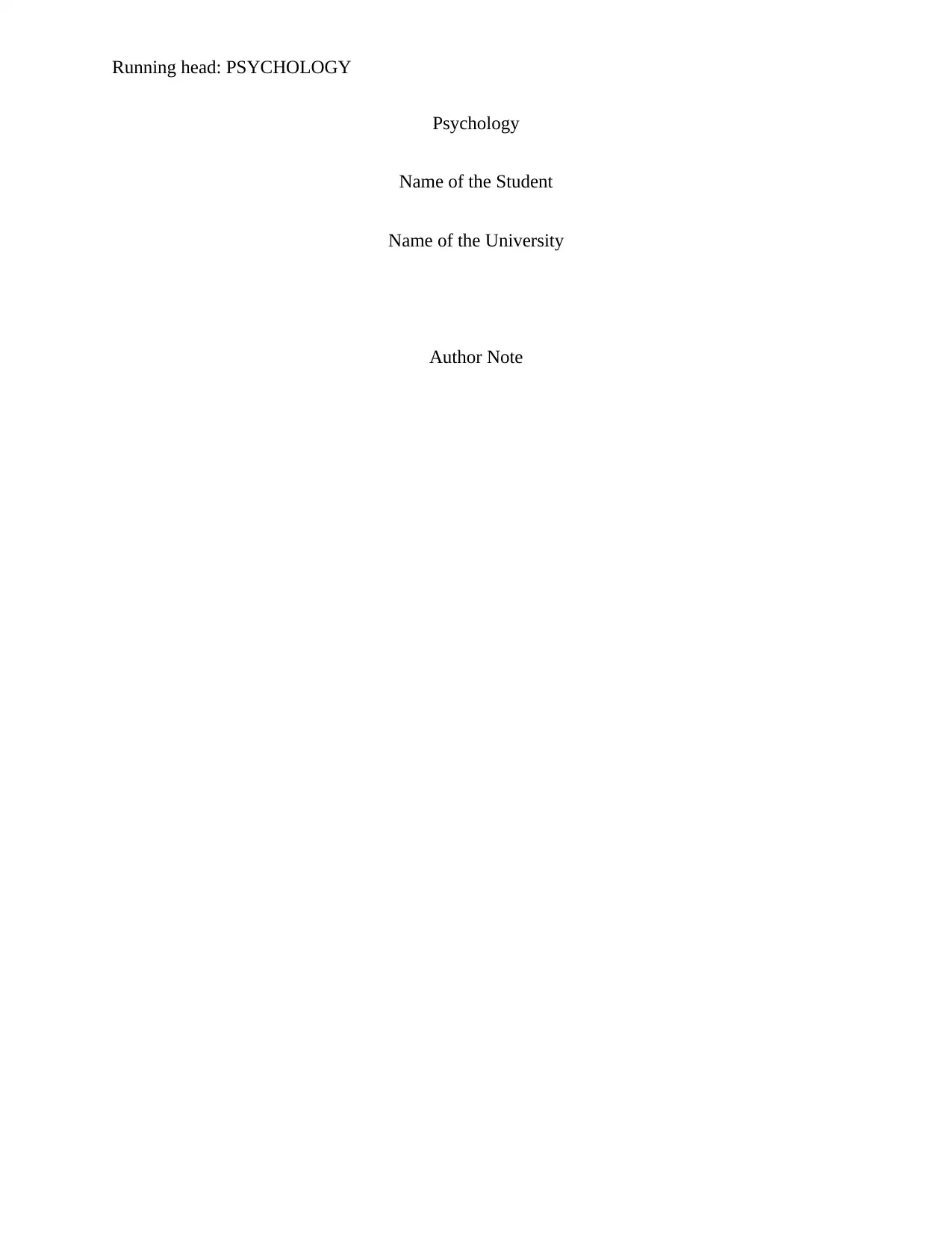
Running head: PSYCHOLOGY
Psychology
Name of the Student
Name of the University
Author Note
Psychology
Name of the Student
Name of the University
Author Note
Secure Best Marks with AI Grader
Need help grading? Try our AI Grader for instant feedback on your assignments.
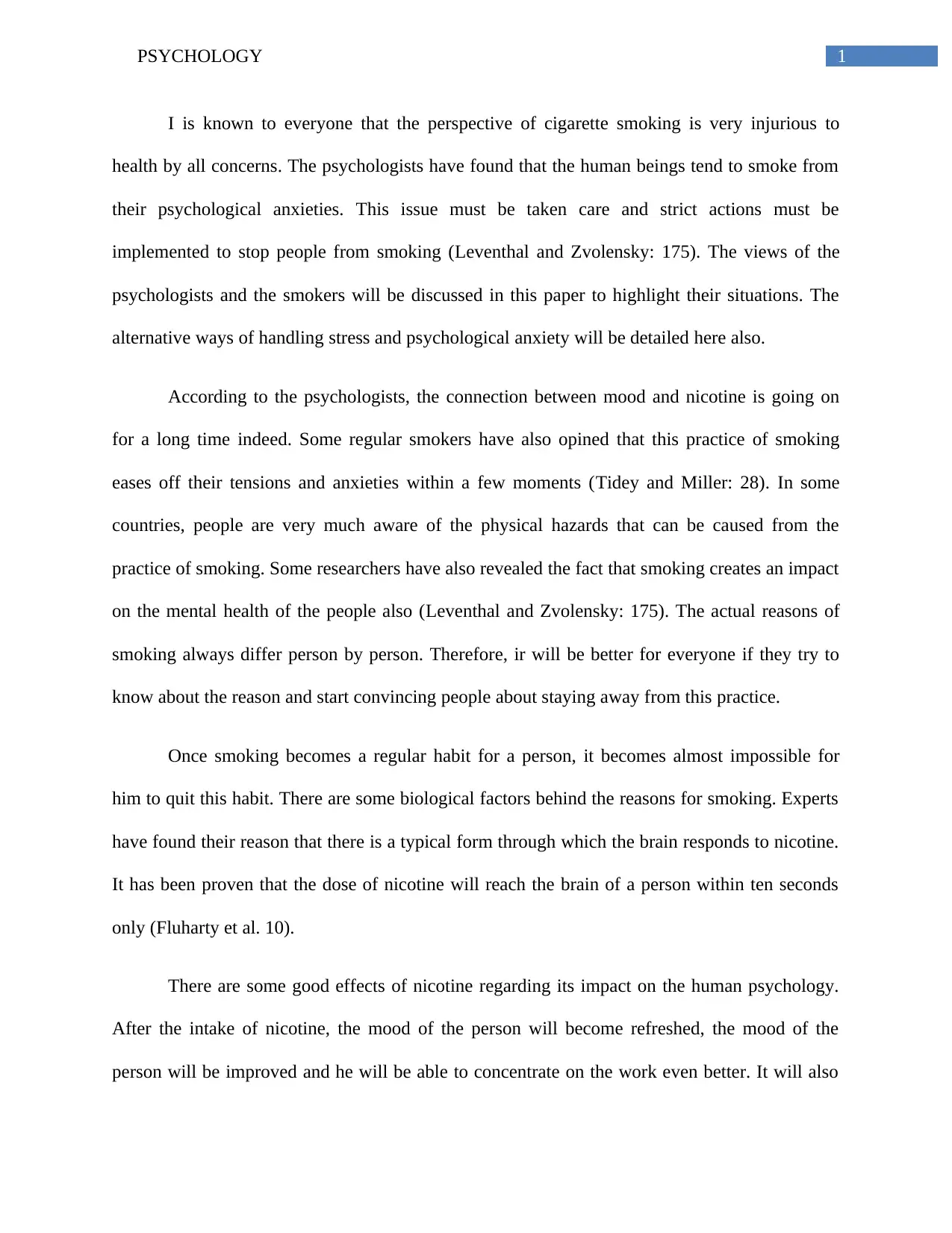
1PSYCHOLOGY
I is known to everyone that the perspective of cigarette smoking is very injurious to
health by all concerns. The psychologists have found that the human beings tend to smoke from
their psychological anxieties. This issue must be taken care and strict actions must be
implemented to stop people from smoking (Leventhal and Zvolensky: 175). The views of the
psychologists and the smokers will be discussed in this paper to highlight their situations. The
alternative ways of handling stress and psychological anxiety will be detailed here also.
According to the psychologists, the connection between mood and nicotine is going on
for a long time indeed. Some regular smokers have also opined that this practice of smoking
eases off their tensions and anxieties within a few moments (Tidey and Miller: 28). In some
countries, people are very much aware of the physical hazards that can be caused from the
practice of smoking. Some researchers have also revealed the fact that smoking creates an impact
on the mental health of the people also (Leventhal and Zvolensky: 175). The actual reasons of
smoking always differ person by person. Therefore, ir will be better for everyone if they try to
know about the reason and start convincing people about staying away from this practice.
Once smoking becomes a regular habit for a person, it becomes almost impossible for
him to quit this habit. There are some biological factors behind the reasons for smoking. Experts
have found their reason that there is a typical form through which the brain responds to nicotine.
It has been proven that the dose of nicotine will reach the brain of a person within ten seconds
only (Fluharty et al. 10).
There are some good effects of nicotine regarding its impact on the human psychology.
After the intake of nicotine, the mood of the person will become refreshed, the mood of the
person will be improved and he will be able to concentrate on the work even better. It will also
I is known to everyone that the perspective of cigarette smoking is very injurious to
health by all concerns. The psychologists have found that the human beings tend to smoke from
their psychological anxieties. This issue must be taken care and strict actions must be
implemented to stop people from smoking (Leventhal and Zvolensky: 175). The views of the
psychologists and the smokers will be discussed in this paper to highlight their situations. The
alternative ways of handling stress and psychological anxiety will be detailed here also.
According to the psychologists, the connection between mood and nicotine is going on
for a long time indeed. Some regular smokers have also opined that this practice of smoking
eases off their tensions and anxieties within a few moments (Tidey and Miller: 28). In some
countries, people are very much aware of the physical hazards that can be caused from the
practice of smoking. Some researchers have also revealed the fact that smoking creates an impact
on the mental health of the people also (Leventhal and Zvolensky: 175). The actual reasons of
smoking always differ person by person. Therefore, ir will be better for everyone if they try to
know about the reason and start convincing people about staying away from this practice.
Once smoking becomes a regular habit for a person, it becomes almost impossible for
him to quit this habit. There are some biological factors behind the reasons for smoking. Experts
have found their reason that there is a typical form through which the brain responds to nicotine.
It has been proven that the dose of nicotine will reach the brain of a person within ten seconds
only (Fluharty et al. 10).
There are some good effects of nicotine regarding its impact on the human psychology.
After the intake of nicotine, the mood of the person will become refreshed, the mood of the
person will be improved and he will be able to concentrate on the work even better. It will also
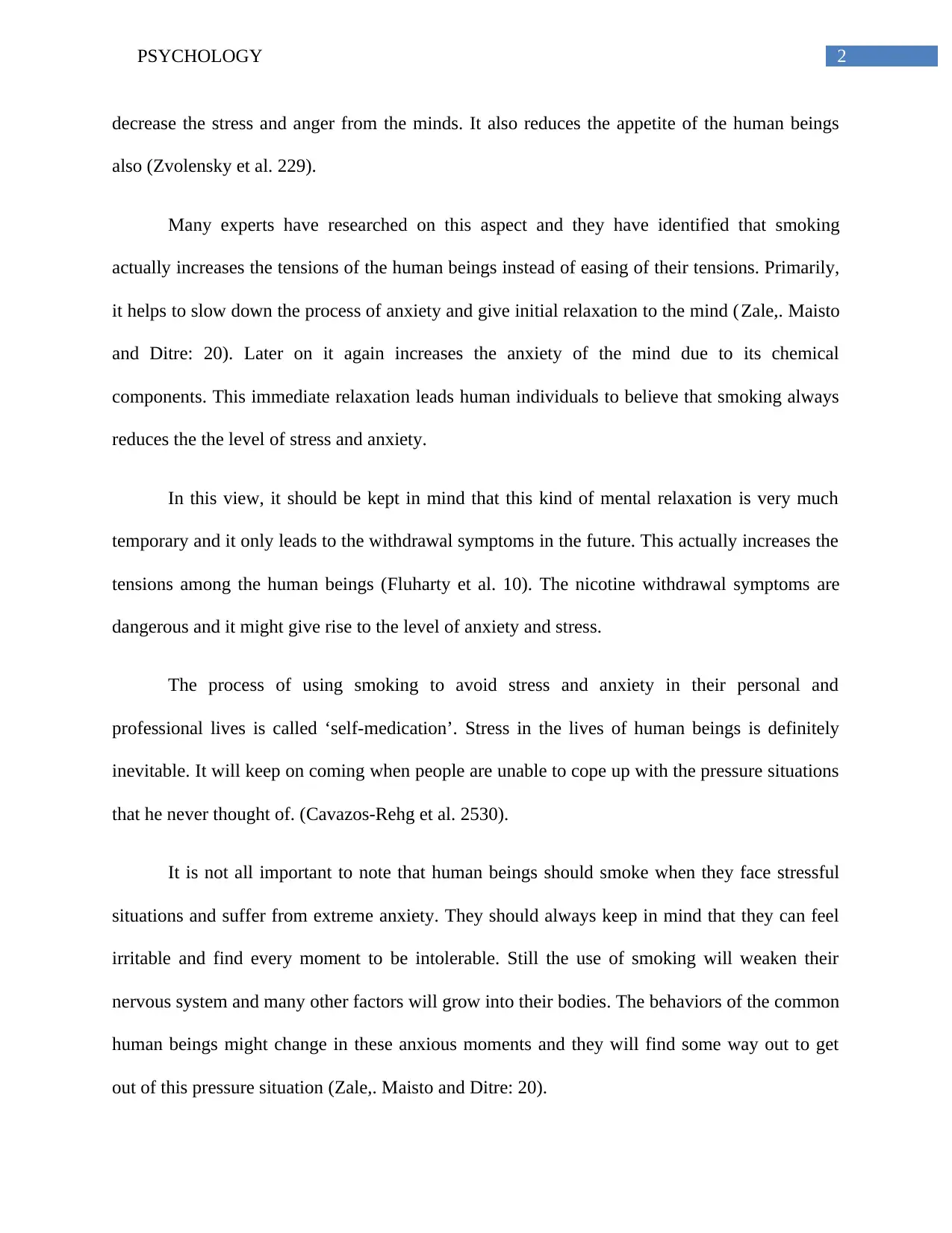
2PSYCHOLOGY
decrease the stress and anger from the minds. It also reduces the appetite of the human beings
also (Zvolensky et al. 229).
Many experts have researched on this aspect and they have identified that smoking
actually increases the tensions of the human beings instead of easing of their tensions. Primarily,
it helps to slow down the process of anxiety and give initial relaxation to the mind (Zale,. Maisto
and Ditre: 20). Later on it again increases the anxiety of the mind due to its chemical
components. This immediate relaxation leads human individuals to believe that smoking always
reduces the the level of stress and anxiety.
In this view, it should be kept in mind that this kind of mental relaxation is very much
temporary and it only leads to the withdrawal symptoms in the future. This actually increases the
tensions among the human beings (Fluharty et al. 10). The nicotine withdrawal symptoms are
dangerous and it might give rise to the level of anxiety and stress.
The process of using smoking to avoid stress and anxiety in their personal and
professional lives is called ‘self-medication’. Stress in the lives of human beings is definitely
inevitable. It will keep on coming when people are unable to cope up with the pressure situations
that he never thought of. (Cavazos-Rehg et al. 2530).
It is not all important to note that human beings should smoke when they face stressful
situations and suffer from extreme anxiety. They should always keep in mind that they can feel
irritable and find every moment to be intolerable. Still the use of smoking will weaken their
nervous system and many other factors will grow into their bodies. The behaviors of the common
human beings might change in these anxious moments and they will find some way out to get
out of this pressure situation (Zale,. Maisto and Ditre: 20).
decrease the stress and anger from the minds. It also reduces the appetite of the human beings
also (Zvolensky et al. 229).
Many experts have researched on this aspect and they have identified that smoking
actually increases the tensions of the human beings instead of easing of their tensions. Primarily,
it helps to slow down the process of anxiety and give initial relaxation to the mind (Zale,. Maisto
and Ditre: 20). Later on it again increases the anxiety of the mind due to its chemical
components. This immediate relaxation leads human individuals to believe that smoking always
reduces the the level of stress and anxiety.
In this view, it should be kept in mind that this kind of mental relaxation is very much
temporary and it only leads to the withdrawal symptoms in the future. This actually increases the
tensions among the human beings (Fluharty et al. 10). The nicotine withdrawal symptoms are
dangerous and it might give rise to the level of anxiety and stress.
The process of using smoking to avoid stress and anxiety in their personal and
professional lives is called ‘self-medication’. Stress in the lives of human beings is definitely
inevitable. It will keep on coming when people are unable to cope up with the pressure situations
that he never thought of. (Cavazos-Rehg et al. 2530).
It is not all important to note that human beings should smoke when they face stressful
situations and suffer from extreme anxiety. They should always keep in mind that they can feel
irritable and find every moment to be intolerable. Still the use of smoking will weaken their
nervous system and many other factors will grow into their bodies. The behaviors of the common
human beings might change in these anxious moments and they will find some way out to get
out of this pressure situation (Zale,. Maisto and Ditre: 20).
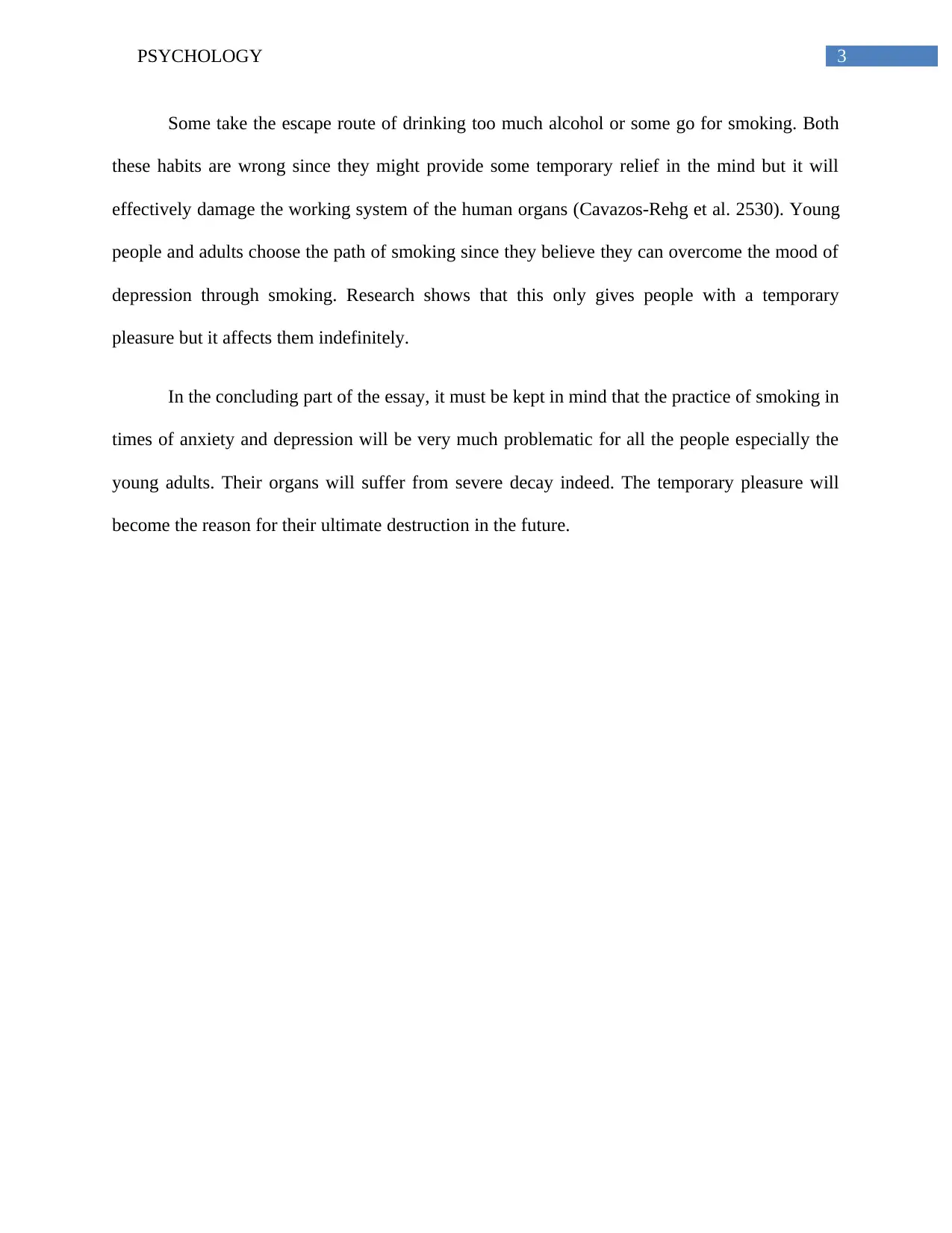
3PSYCHOLOGY
Some take the escape route of drinking too much alcohol or some go for smoking. Both
these habits are wrong since they might provide some temporary relief in the mind but it will
effectively damage the working system of the human organs (Cavazos-Rehg et al. 2530). Young
people and adults choose the path of smoking since they believe they can overcome the mood of
depression through smoking. Research shows that this only gives people with a temporary
pleasure but it affects them indefinitely.
In the concluding part of the essay, it must be kept in mind that the practice of smoking in
times of anxiety and depression will be very much problematic for all the people especially the
young adults. Their organs will suffer from severe decay indeed. The temporary pleasure will
become the reason for their ultimate destruction in the future.
Some take the escape route of drinking too much alcohol or some go for smoking. Both
these habits are wrong since they might provide some temporary relief in the mind but it will
effectively damage the working system of the human organs (Cavazos-Rehg et al. 2530). Young
people and adults choose the path of smoking since they believe they can overcome the mood of
depression through smoking. Research shows that this only gives people with a temporary
pleasure but it affects them indefinitely.
In the concluding part of the essay, it must be kept in mind that the practice of smoking in
times of anxiety and depression will be very much problematic for all the people especially the
young adults. Their organs will suffer from severe decay indeed. The temporary pleasure will
become the reason for their ultimate destruction in the future.
Secure Best Marks with AI Grader
Need help grading? Try our AI Grader for instant feedback on your assignments.
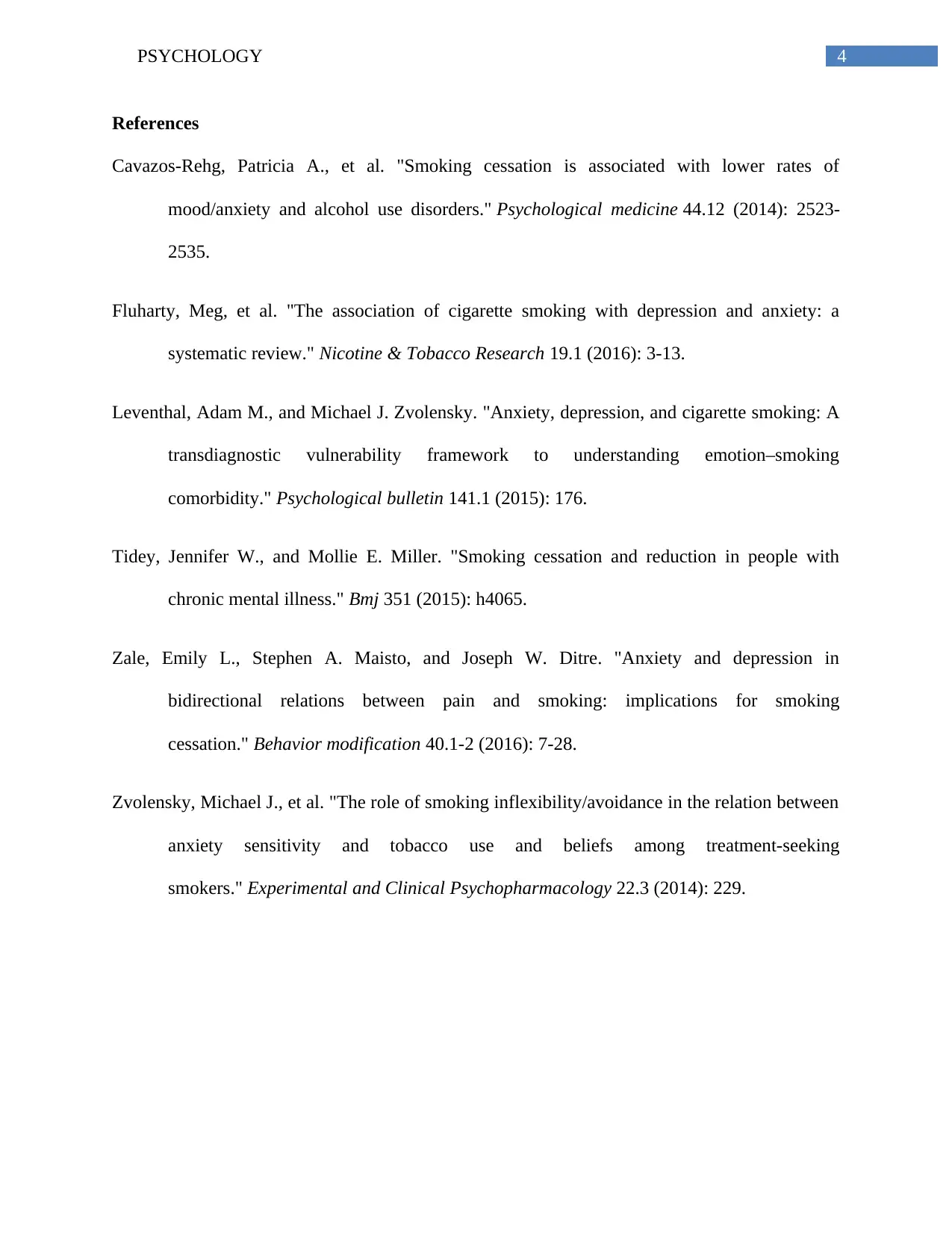
4PSYCHOLOGY
References
Cavazos-Rehg, Patricia A., et al. "Smoking cessation is associated with lower rates of
mood/anxiety and alcohol use disorders." Psychological medicine 44.12 (2014): 2523-
2535.
Fluharty, Meg, et al. "The association of cigarette smoking with depression and anxiety: a
systematic review." Nicotine & Tobacco Research 19.1 (2016): 3-13.
Leventhal, Adam M., and Michael J. Zvolensky. "Anxiety, depression, and cigarette smoking: A
transdiagnostic vulnerability framework to understanding emotion–smoking
comorbidity." Psychological bulletin 141.1 (2015): 176.
Tidey, Jennifer W., and Mollie E. Miller. "Smoking cessation and reduction in people with
chronic mental illness." Bmj 351 (2015): h4065.
Zale, Emily L., Stephen A. Maisto, and Joseph W. Ditre. "Anxiety and depression in
bidirectional relations between pain and smoking: implications for smoking
cessation." Behavior modification 40.1-2 (2016): 7-28.
Zvolensky, Michael J., et al. "The role of smoking inflexibility/avoidance in the relation between
anxiety sensitivity and tobacco use and beliefs among treatment-seeking
smokers." Experimental and Clinical Psychopharmacology 22.3 (2014): 229.
References
Cavazos-Rehg, Patricia A., et al. "Smoking cessation is associated with lower rates of
mood/anxiety and alcohol use disorders." Psychological medicine 44.12 (2014): 2523-
2535.
Fluharty, Meg, et al. "The association of cigarette smoking with depression and anxiety: a
systematic review." Nicotine & Tobacco Research 19.1 (2016): 3-13.
Leventhal, Adam M., and Michael J. Zvolensky. "Anxiety, depression, and cigarette smoking: A
transdiagnostic vulnerability framework to understanding emotion–smoking
comorbidity." Psychological bulletin 141.1 (2015): 176.
Tidey, Jennifer W., and Mollie E. Miller. "Smoking cessation and reduction in people with
chronic mental illness." Bmj 351 (2015): h4065.
Zale, Emily L., Stephen A. Maisto, and Joseph W. Ditre. "Anxiety and depression in
bidirectional relations between pain and smoking: implications for smoking
cessation." Behavior modification 40.1-2 (2016): 7-28.
Zvolensky, Michael J., et al. "The role of smoking inflexibility/avoidance in the relation between
anxiety sensitivity and tobacco use and beliefs among treatment-seeking
smokers." Experimental and Clinical Psychopharmacology 22.3 (2014): 229.
1 out of 5
Related Documents
Your All-in-One AI-Powered Toolkit for Academic Success.
+13062052269
info@desklib.com
Available 24*7 on WhatsApp / Email
![[object Object]](/_next/static/media/star-bottom.7253800d.svg)
Unlock your academic potential
© 2024 | Zucol Services PVT LTD | All rights reserved.





